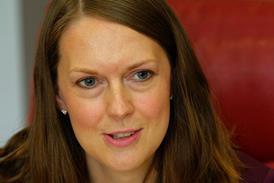Andy Cowper reflects on the leadership and management skills of Dame Julie Moore, who has just retired as chief executive of University Hospitals Birmingham FT
I promised you, dear readers, a column on dismantling fences with regard to my observation about the NHS having parochial rules and regulations, while now being told to act ecumenically. I will write it, next week.
This week’s column is triggered by the well earned retirement of one of the great NHS leaders, Dame Julie Moore. She retired this week as the long serving chief executive of University Hospitals Birmingham Foundation Trust, after having spent a challenging few years double running her own trust and also taking her management team into Heart of England FT to successfully turn around its free falling finances and performance, and then successfully bring it into UHB.
I first met Dame Julie when she agreed to chair HSJ’s Commission On Hospital Care For Frail Older People. This was an unpaid role, requiring a significant commitment of time and effort from Dame Julie and all the commissioners.
Despite HSJ’s longstanding reputation for editorial integrity in general and on sponsored projects, some commissioners had concerns about the sponsors (who had well publicised problem incidents over their past NHS work).
A very frank opening meeting cleared the air; aired the problems; and agreed that the commission was going to find what it would find – without fear of favour to the NHS or the private and third sector in general and to the sponsors in particular. This was helped by the humility and evident passion for the subject of sponsor and commissioner John Myatt (then of Serco, now of Optum), but Dame Julie’s probing questions and shrewd chairing got the matter done and dusted within an hour, and we actually started proper work that day.
The commission remains one of the professional projects I’m most proud of having been involved in writing. I think to this day that its scoping and main reports were serious contributions, with enduring value. We had great commissioners, superb submissions, but above all, we had a chair who kept meetings creative, focused, light and highly productive. That combination made the work a pleasure.
I won’t pretend I wasn’t apprehensive ahead of that first meeting, given the commissioner’s pre-expressed concerns about the sponsor (and Dame Julie’s formidable personal reputation), but Dame Julie’s intellect, sharpness and (above all) dry sense of humour made things work.
Her contribution to the broader NHS environment as a proudly out LGBT leader is another important part of her legacy. I discuss her general candour in more detail below, but back at the time when she chose to be proudly out (without ever letting it wholly define her), there was not zero risk in making that decision. She did it with consistency, courage, integrity and style. I have no doubt that example made things better for many of her staff and colleagues to feel able to be who they are, publicly and proudly.
The qualities making a good NHS leader
There is not only one way to be a good (or even great) chief executive. Dame Julie herself has repeatedly expressed her belief that while a clinical background (such as hers in nursing) is very helpful, there are no guarantees that a good clinician will automatically be a good leader or chief executive. You’ve got to want it; to believe you can do it; and to have the cultural, technical, political and people skill sets. These are big, challenging jobs.
It’s also important to acknowledge that Dame Julie came into an organisation that had been consistently high performing and well led by Sir Johnathan Michael and Mark Britnell. UHB had for a long time taken management development and succession planning seriously. It is not accident or surprise that UHB’s board, having looked widely, chose to appoint their medical director Dr David Rosser – who will do the job differently (and, I’m sure, well). Success, like failure, happens in a context.
I think there are three broad factors that we can learn from Dame Julie’s career and success.
Rigour and toughness
You don’t succeed in the NHS as an articulate, out nurse with strong opinions without being tough. And you don’t stay successful without rigour.
Having had the pleasure to witness Dame Julie at work, with and around her teams in UHB and the former HEFT, what is genuinely striking is how they challenge one another. The challenge is always appropriate, professionally respectful, and always evidence based, but it is a challenge of the very best kind: in the interests of providing the best and safest patient care.
UHB’s culture is to challenge: not for challenge’s own sake, but to ensure that it is a learning organisation. Properly done root cause analysis of problems may be uncomfortable, but it is the only certain way to make sure that people know that (and how) they are accountable and responsible for their actions and behaviours.
Importantly, they are curious about how things are done elsewhere. This is nothing like as widespread in the NHS as it should be. The flip side of this is that the UHB way is also generous in being willing to share what they know and have learned.
It is no accident that the UHB management team have been asked by regulators to be involved in buddying/management support for other trusts. It is also no accident that while they have had successes, they have also had instances where the trust in need of help couldn’t or didn’t see that it needed it. In those circumstances, the UHB team has had the great sense to get out sooner rather than later. There are none so blind as those who will not see, and there are a finite number of hours in the day to do something worthwhile.
UHB’s is not a JFDI shout-y culture, nor an accusatory one. Its guiding principle is one of “just accountability”. Dame Julie’s observations on this were an important contribution to HSJ’s The Case For Patient Safety report.
Independence and outspokenness
Dame Julie has a well earned reputation for not suffering fools gladly. It has not made her a pin up in the NHS fool community. This is one of the very best things about her.
The political and media atmosphere that impacts on NHS leaders can feel oppressive. This acknowledged and said, there is equally a massive risk in NHS management culture of endemic Stockholm Syndrome, where chief executives feel unable to speak out or tell the obvious truth.
While there have been gradual improvements and greater courage in a few cases, I still think too many NHS leaders and system leaders get this badly wrong. As I wrote nearly a year ago, in an NHS where no chief executive is “bulletproof” by their trust’s finance/quality performance any more, actually that means everybody is.
One of the main messages of the HSJ Frail Older People Commission was straight out of Dame Julie’s mouth: we’ve got to stop kidding ourselves that we will bend the demand for hospital care for this group down by much, or make immense cost savings. Subsequent events have vindicated this completely: at the time, it was not particularly well received.
Dame Julie has never been much of a fan of fashionable or magical thinking.
She has also consistently had the courage to speak out, using national print and broadcast media to get the issue of the NHS accident and emergency demand and funding crisis much higher up the priority agenda.
It would be fair to say that in her double running time as HEFT’s interim chief executive, Dame Julie’s candour centric approach led to some bracingly direct conversations with the regulators. The detailed story of that takeover will make a good read; suffice it to say that Dame Julie and colleagues did not get the support they were originally promised or amply deserved.
One final thought strikes me as the NHS workforce crisis lumbers on with no prospect of resolution in sight: during the commission’s work, I remember that Dame Julie told the commissioners, “the way we work is that if you’re interviewing for a nursing vacancy, and if you see two good nurses, hire them both: you’ll always need good nurses”.
This was a striking thing to say or think, at a time when Monitor was formally recommending to FTs that a certain level of agency nursing use (IIRC, the figure might have been 10-15 per cent) was conducive to optimal NHS workforce management.
One reflection here: how well are we encouraging and incentivising the rising generation of NHS managers and leaders to be properly independent and outspoken? Not terribly well, in my view.
Kindness
Now she has retired, I think it’s fair game to reveal Dame Julie’s hidden weapon.
It is kindness.
It is not a heart-worn-on-the-sleeve kindness. Nor is it is a virtue signalling kindness. But it is very real, and it is fundamental to her approach and passion for high quality, safe, prompt patient care.
Walking around her hospitals with her – walks that were unannounced, unplanned and unscheduled – Dame Julie was warmly recognised by the front line staff, having easy and straight to the point conversations. They knew her, and vice versa. (This sits in gorgeous contrast to the story of one of her fellow Midlands chief executives who, taken by a new found passion for doing a walkabout of his hospital, was thrown out of his A&E one evening by security staff who, alongside the medics, did not recognise him).
It is why she went out of her way to praise the staff at HEFT as some of the best she’d ever known on BBC Newsnight, and it was quickly appreciated in HEFT that she meant what she was saying.
Out of the kindness comes the authenticity, and the ability to connect.
Dame Julie might well kill me for writing this, but that’s OK: none of us is immortal. Her contribution to the NHS has been huge, and her retirement is well deserved. I hope it will be long and happy.
I also hope that if she so wishes, her leadership and management experience can be brought back to bear in future – but only after a well earned and proper break. And of course, on her own terms: there are surely no others worth discussing.
































8 Readers' comments